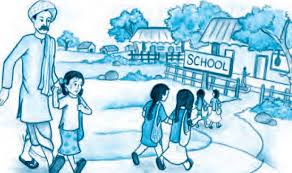Varieties of Spoken Language : Register, Style & Dialect
Varieties of Language (Register, Style & Dialect)
Variety of Spoken Language: Register :-
Registers are one of the varieties of spoken English language. It can be defined as a formality in a written text. These are the stylistic functional varieties and suggest almost a distinctive piece of a language.
Registers are occasion oriented. These are selected on the basis of some facts, such as what material is to be written and for what purpose, where is it being sent and most importantly to whom is it to be sent etc. One may use a specific kind of language in one case while he/she may switch over to the other based on the state of affairs.
Hence, there exists a variety of registers based on the occasion. We can take, for example, the language of newspaper headlines, church services, sports commentaries etc. as the different forms of register.
In Linguistics, Register is defined as the way a speaker uses a language differently in different circumstances. His/her words, tone and body language vary accordingly. While chatting with friends she/he behaves differently than when attending a formal dinner party or facing an interview board. These varieties in formality are called artistic variations. In Linguistics, these are known as registers. They are determined by such factors as-
a) social occasions,
b) concert purposes,
c) audience, etc.
Registers are marked by a variety of specialised vocabulary, terms of phrases, colloquialism, use of jargons, different intuition and pace. Generally, people divide register in two types only-
a) formal, and
b) informal.
But it is over simplification.
Linguistics marks five different Registers :-
a) Frozen-
used in ritualistic, traditional, religious ceremonies and prayers etc.
b) Formal -
It is a language spoken while talking to strangers or in formal occasions such as a business presentation, during an interview or while talking to your seniors.
For example- "would you mind passing me that book?"
Sometimes it is also used while making sarcastic comments. However, that's a different case.
c) Consultative -
A moderately formal language used in giving advices or in information exchange between expert-client, teacher-student etc.
Example- specialised knowledge, offering advice.
d) Casual -
It is a casual or informal language. It consists of slangs and commonly used or everyday words as in a birthday party, family dinner or with friends.
Example - "pass me that book."
e) Intimate -
It is a highly informal language based on the intimacy of a relationship; Often in private.
Five types of Register |
|
|---|---|
| Frozen | This is a language used in customs and traditions. Ex. Prayers, traditional and religious ceremonies |
| Formal | A language spoken between strangers or in formal occasions such as a business presentation, during an interview or while talking to your seniors. For example- "would you mind passing me that book?" |
| Consultative | Moderately formal language between expert-client, teacher-student etc. Example- specialised knowledge, offering advice. |
| Informal (Casual) | Casual or informal register consists of slangs and commonly used or everyday words as in a birthday party, family dinner or with friends. Example - "pass me that book." |
| Intimate | Highly informal language; Often in private. |
Varieties of language :Style :-
Style can be defined as the way an author uses the words, sentence fluency, phrases and the sentences itself. It can also be referred to the way of writing or doing a work to make it fit for a specific context, audience or purpose.
The main purpose of style is to present the information in an appropriate manner to the audience and to fulfil the purpose of writing. So the writer chooses the words as per the audiences' demands and their style. After reading a number of books of a same author we can easily recognize his/her style.
For example, the style of Shakespeare is tragic plays as he has written a number of famous tragedies such as Hamlet, king Lear, Romeo and Juliet etc.
Same as Register, Style is also occasioned by situational variations. However, it is less predictable and varies according to the personal preferences of the author. Further, while register is often connected with a specific vocabulary employed and particular speech situation, style includes variations in grammar as well.
Varity of language: Dialect :-
A dialect is a regional or social variation of a language which differs from the standard form of that language. It can be defined as a regional or social variety of a language arising out of geographical or social differences. A dialect is marked by distinguished vocabulary, pronunciation and/or grammar of a regional variety of a language.
Very few people speak the actual standard form of a language, most other adopt its regional variety. In fact, the speeches of even two individuals differ in their totality. Hence, the unique linguistic system that an individual possess is called as idiolect. If we combine the idiolects of a specific group of persons having many characteristics in common and derive an abstraction, we find the dialect.
Influence of Social background :
We know that geography can produce a variety in a language. But apart from this, social background can also influence the speech pattern in a language.
For example, if two babies are born in the same city but one in a wealthy family and the other in a family not that well-off. One goes in a very prestigious school and takes expensive education but the other goes in a simple state run school. They both will end up speaking different varieties of the same language based on their social influences.
Example of dialects in English :-
British English, American English, Indian English etc.
Dialect should not be confused with accents. Accent depends upon an individual's distinctive pronunciation but the dialect is a more broader term it includes distinct vocabulary, grammar and the pattern of sentence structure.
READ MORE IN ENGLISH LANGUAGE :-
- Organs of Speech.
- Synchronic and Diachronic approaches to study of language.
- Registers, dialect and style.
- Phonemes and allophones.
- Phonetics and Phonology.
Language Varieties: Register, Style & Dialect |
| Credit: Wikimedia.org |
.jpeg)

.jpeg)
.jpeg)

.jpeg)




Comments
Post a Comment
Your Views and Comments means a lot to us.